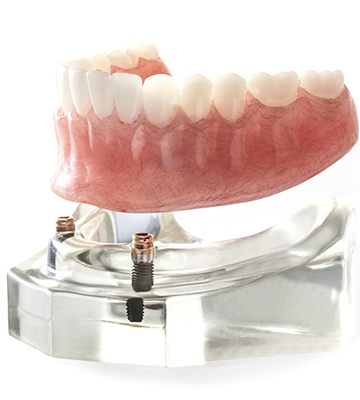Implant Dentures – Colleyville, TX
A Better Kind of Denture
When all of the teeth need to be removed or are already missing, patients have three treatment options: 1) Traditional Complete Denture, 2) Removable Implant Denture, or 3) Permanent Full-arch Implant Bridge. Traditionally, complete dentures or “dentures” were the only options available to replace missing teeth. The upper denture is tolerated well by most patients because a “suction-like” effect can be achieved by covering the roof of the mouth. However, this can be uncomfortable for most patients and can cause changes in speech. The lower denture causes patients all kinds of trouble. Since it rests on the gums and is held in place by the lips, cheeks, and tongue, it can be displaced very easily when one speaks, eats or swallows. This can be very frustrating to both the patient and the treating dentist. To improve the retention and stability of traditional dentures, most patients use denture glues or adhesives to help hold them in place. With dental implants, the complications associated with traditional dentures have been addressed because they “snap” onto the dental implants, which allow patients to eat, speak and sing without the fear of their “teeth” coming loose.
Why Choose DFW Dental Implant Center for Implant Dentures?
- Multiple denture options that are suited for any patient
- Dentist with years of prosthodontic training
- All prosthetics made by our on-site lab
What are the Benefits of an Implant Denture?

- Increased retention and stability of the denture
- Improved chewing efficiency
- Improved speech
- Improved taste sensation
- Improved self-esteem
- No palatal coverage
- Easy to clean
- More comfortable
- Stronger (Titanium-Reinforced)
What Can You Expect During Dental Implant Treatment?

Step 1: Determine the Position of the Dental Implants on the Digital Treatment Planning Software
After reviewing your 3D CAT scan to evaluate the amount of bone and the number of dental implants that can be placed, a surgical guide will be made based on the denture tooth setup. This will allow the dental implants to be positioned correctly underneath the denture teeth for an ideal result.
Step 2: Place the Dental Implant Using A Surgical Guide and Deliver Temporary Dentures
The surgical guide will be used to place between two and four dental implants in the jawbone depending on the treatment plan. After the surgery is completed, temporary dentures will be lined with a soft material for added comfort. The soft reline will also improve the fit of the temporary dentures and prevent excessive pressure on the dental implants as they heal.
Step 3: Deliver Your New Implant Dentures
After 4 months of healing, a final impression of the dental implants and gums will be made to begin making the implant denture. After the dentures have been made, the implant dentures will “snap” on to the dental implants providing a stable, retentive denture with natural looking denture teeth.
Implant Dentures FAQs
How Long Do Implant Dentures Last?
While traditional dentures typically last for a few years before needing replacement, restorations supported by dentures can last for thirty years or even a lifetime if they receive excellent care. To make your implant dentures last for as long as possible, make sure to brush, floss, and rinse with antibacterial mouthwash daily while seeing us regularly for checkups and cleanings at our Colleyville office. It’s also a great idea to refrain from chewing on items that are especially hard or sticky as well as opening packages or bottles with your teeth. Smoking and excessive alcohol use are also linked to early dental implant failure.
Does Getting Dental Implants Hurt?
Before placing a dental implant, our dentist will administer an appropriate anesthetic to ensure that the process is completely painless, and you may also receive sedation if necessary. Since the jawbone does not have many nerve endings to begin with, it does not have much capacity to send pain signals to your brain anyway. While you may experience some soreness after the surgery, you can manage this issue with prescribed or over-the-counter pain medication. Cold compresses or ice packs may also help you reduce your discomfort and inflammation. However, contact our Colleyville office if your soreness gets worse after several days, as this may be a sign of infection.
Are Dental Implants Safe?
Dental implants are perfectly safe when placed by a qualified professional for almost all adults in adequate oral health. If you have issues that can preclude you from receiving implants such as gum disease or thin jawbones, we can address them in our office with an appropriate treatment such as bone grafts. While health concerns such as pregnancy, hemophilia, diabetes, and cancer can complicate the dental implant placement process, they do necessarily mean that you are disqualified as a candidate. Just be sure to mention these issues during your consultation so we can plan your treatment accordingly.
How Successful Are Dental Implants?
Dental implants placed by a qualified professional boast an incredible success rate of over 95% even ten years after being placed, but the lifespan of your restorations will be mostly determined by how well you take care of them. It’s still important to brush, floss, and use antibacterial mouthwash every day while visiting our office in Colleyville every six months for checkups even if all your teeth have been replaced with implants. It’s also best to refrain excessive consumption of foods and beverages that are sticky, crunchy, acidic, sugary, or alcoholic. The lifespan of your implant can also be influenced by where it is located in the mouth. For example, restorations replacing molars will endure more pressure than those replacing the front teeth, so they may fail sooner.
